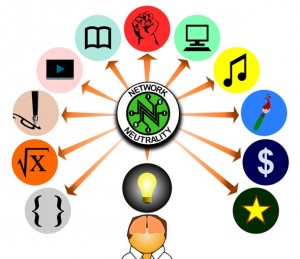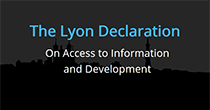Last year, Global Currents reported on the history and current rulings relating to net neutrality. In light of recent decisions from the Federal Communications Commission (FCC) on this issue, this post will bring you up to speed on what’s happening now.
Net neutrality is the idea that all content on the Internet be treated equally. In other words, under net neutrality legislation, Internet service providers (ISPs) will not be able to give preference to certain websites, or allow for Internet “fast lanes” to companies who pay more.
We left off our last post on the issue when the FCC was opening a four-month window for public input before passing further legislation. At this time, the United States Court of Appeals ruling on Verizon vs. FCC held that previous rules pertaining to net neutrality produced by the FCC were not valid, because ISPs were not common carriers. This meant that ISPs fell outside of the realm of authority for the FCC, under Title II of the Communications Act of 1934 (47 U.S.C.). This is one of the important things that has changed in the past year.
In November of 2014, President Obama released a statement on net neutrality. Obama urged the FCC to reclassify the Internet as a utility, which would make it a common carrier and allow the commission to regulate ISPs. He stated, “For almost a century, our law has recognized that companies who connect you to the world have special obligations not to exploit the monopoly they enjoy over access into and out of your home or business. It is common sense that the same philosophy should guide any service that is based on the transmission of information — whether a phone call or a packet of data.”
On February 26th, 2015, the FCC followed this advice and voted to reclassify the Internet as a common carrier. Along with this decision came the FCC’s new Open Internet Rules, which were released to the public on March 12th. The three rules are:
- No blocking – ISPs cannot block any lawful content from consumers.
- No throttling – ISPs cannot control the Internet speed for any content or services, regardless of the applications or devices being used.
- No paid prioritization – ISPs cannot provide faster Internet service in exchange for payment. This means there cannot be any “fast lanes” of Internet content.
But, the FCC’s latest decision is not the end-all solution for net neutrality. The debate rages on as ISPs like Verizon and AT&T, and many (mostly Republican) lawmakers argue that the ruling places too much regulation on Internet service and will stifle innovation. FCC chairman Tom Wheeler has been called to several meetings with lawmakers since the ruling, being forced to explain and defend the commission’s position. The conversation on this issue is definitely not over, and it remains to be seen what will become of the FCC’s latest ruling.
The sources below will help you brush up on the net neutrality issue!
Web Resources
What is net neutrality and what does it mean for me? – USA Today
How Net Neutrality Works (Video) – New York Times
The Open Internet: A Case for Net Neutrality
Government Docs
The FCC Rulings:
- Federal Communications Commission. (2005). Policy Statement: FCC 05-151.
- Federal Communications Commission. (2010). Report and Order: FCC 10-201.
- Federal Communications Commission. (2014). Notice of Proposed Rulemaking: FCC 14-61.
- Federal Communications Commission. (2015). REPORT AND ORDER ON REMAND, DECLARATORY RULING, AND ORDER: FCC 15-24.
The Communications Act of 1934:
Additional places to search for U.S. legislation:
- Congress.gov
- Legal Information Institute- Cornell Law: Look up U.S. Code
- U.S. Government Publishing Office


